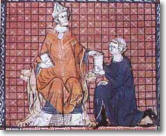 Roland Bandinelli, who succeeded Hadrian IV, was a man of great qualities of
character and mind. He had taught canon law at Bologna at the very time when
Gratian was at work on his monumental decree. Pope Eugene III made him a
cardinal and chancellor of the Apostolic See. Much could be expected from such a
pope and much was accomplished; but owing to imperial interference, the Pope was
not free to devote himself entirely to constructive activity until the last
years of his long pontificate.
Roland Bandinelli, who succeeded Hadrian IV, was a man of great qualities of
character and mind. He had taught canon law at Bologna at the very time when
Gratian was at work on his monumental decree. Pope Eugene III made him a
cardinal and chancellor of the Apostolic See. Much could be expected from such a
pope and much was accomplished; but owing to imperial interference, the Pope was
not free to devote himself entirely to constructive activity until the last
years of his long pontificate.
What happened was this. Hadrian's death had left Rome seething. Most of the
cardinals wished to hold the election at Anagni far from the Roman mob, but the
Romans quickly stopped that. They refused to allow Hadrian to be buried until
all was set for the election. In spite of all the imperialists' efforts,
Cardinal Roland Bandinelli was elected by a large majority. Then followed an
undignified scene. Cardinal Octavian, the imperialist candidate, tried to tear
the papal mantle away from Roland, then produced a mantle of his own, and
fighting off the angry cardinals, made his way to the high altar of St. Peter's,
where he announced his election as Victor IV.
The imperialists acclaimed him with enthusiasm and forced the real pope to
retire to a fortress for safety. Alexander III, as the new pope chose to be
called, thus began his pontificate in strife. Emperor Frederick naturally backed
Octavian. He called a council at Pavia, and when Alexander refused to have
anything to do with it, the council finally proclaimed Octavian or Victor IV
true pope. But if the Emperor and his minions backed Octavian, most of Europe
rallied to Alexander. Yet for years the fight went on. It was under these
circumstances that Henry II of England and St. Thomas of Canterbury fought over
the Constitutions of Clarendon, and if Alexander seemed to lack firmness
sometimes in dealing with the fierce Plantagenet, his delicate circumstances
must be kept in mind. At last Alexander forged the alliance between pope,
Normans of Sicily, and Lombard communes which was to check the haughty
Frederick. After many vicissitudes Frederick's German chivalry went down before
the Italian burghers at Legnano in 1176, and the next year at Venice a truce was
signed between Alexander and Frederick which brought peace. Once peace gave him
the opportunity, Alexander called the tenth general council, the Third Lateran,
to meet in 1179.
At his council many decrees were passed reforming the Church
and remedying outstanding social abuses. Tournaments were strictly forbidden,
the truce of God reemphasized, and excommunication hurled at those who robbed
poor shipwrecked people. Alexander was a great defender of the downtrodden. Jews
enjoyed his protection and indeed even occupied positions in the papal service.
He took many steps to help the poor and was always quick to praise rulers who
did something for their poorer subjects. Even greater was Alexander's
contribution to education. He protected masters from undue exactions for the
license to teach, he insisted on freedom for those who were competent to teach,
he worked to spread free education "so that the poor may rejoice." He has been
called Europe's first minister of education. Alexander III died August 31, 1181,
at Civita Castellana. The Romans, once more in a state of turmoil, insulted his
body, but the North Italian city states have left him an epitaph and a monument
in the city which checked Frederick Barbarossa, the city named after the great
Pope--Alessandria.
Excerpted from "Popes
Through the Ages" by Joseph Brusher, S.J.

